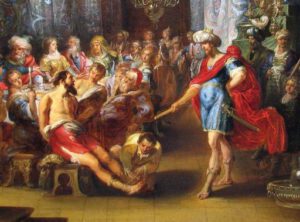The Readings of today provide at least a faint background to the goings-on in West Asia, a region long steeped in violence and terrorism. While the Jews claim that the recent attack on Israel has been the deadliest for them since the German Holocaust, one can’t help but think of the Prince of Peace who once walked that way with a promise of great hope for the human race!
God made many several covenants with the people of Israel. In the First Reading (Is 25: 6-10) we note His promises of freedom and celebration on Zion, the mount on which the city of David was built. In its Temple God has promised to unite the peoples of the world. There they will live in harmony, putting behind them pride, hatred, injustice and war. With joy and life replacing mourning and death, the people will sing, “This is the Lord; we have waited for Him; let us be glad and rejoice in His salvation.”
The Lord is none other than Christ our Saviour. David’s Psalm 23, too, famously reminds us that in good times and in bad, in sickness and in health, the Lord is our Good Shepherd. Those who trust in Him shall not want but enjoy green pastures, restful waters, sufficient repose and a joyful spirit. For He is the God of wisdom, strength and kindness; who guides us, walks by our side, comforts, feeds and anoints us. The Psalm spoke warmly to the heart of pastoral Israel.
Jesus’ parable in today’s Gospel text (Mt 22: 1-14) brings the images of the Old Testament closer to us by comparing the Kingdom of Heaven to a sumptuous wedding banquet. The first invitees (representing the Jews, who were the first to hear God’s Word) failed to honour the king’s (God’s) invitation: they not only went about their own petty tasks, but even killed the king’s messengers! Much like the owner of the vineyard, in last Sunday’s parable, the king sent his troops to destroy the murderers and burn their city. Finally, he extended his invitation to the rest of the world (thus announcing the universality of the Kingdom of God), and the wedding hall (His Church) was full.

But then again, who is the “man who had no wedding garment”? In those days, all guests were supplied with a robe to wear at the banquet; but here was a stranger, probably a crasher, who either had no robe or had failed to wear one. Not to be taken for a poor man but a guest flouting the norms, he is, quite expectedly, shown the door. In like manner, why won’t those who disregard the Commandments be bound hand and foot and cast into the “outer darkness” (hell), where men “weep and gnash their teeth”?
Jesus makes it clear that the divine invitation is gratis but also exacting. It is the wearing of the garment of Christ in a worthy manner that will entitle us to the heavenly banquet. Even though He has invited all into His tent, only those who have fulfilled the stipulated conditions will be chosen to dine with Him.[1] It is ironical that even at the Last Supper this truth had not dawned on the Apostles!
For that matter, did the Jews remember the parable when Jerusalem and the temple were reduced to rubble in 70 A.D.? And will they now turn a new leaf? God, who is slow to anger and abounding in love, is never discouraged. He continues to make overtures of friendship. Hence, quite significantly, the Jews, themselves a persecuted and dispersed lot, are gathering back in their land after two millennia in exile. This is not to absolve their governments from their continued violence, which is the handiwork of evil men in the Holy Land. Be that as it may, will the Jews finally seize the day and turn to the True God?
Only a profound change of heart can bring about a transformation in the world at large. St Paul refers to the necessary dispositions, in the Second Reading (Phil 4: 12-14, 19-20). He who had received substantial material help from the Philippians was not overly concerned about how he should be living. The message he wishes to highlight is that God is the great Provider of our every need, according to His riches, in marvellous ways, in His Son Jesus. So, when we are with the Good Shepherd, we have nothing to fear; when the Good Lord is with us, none can be against us.
Let us therefore never decline a good invitation; and if it be a divine call, let us accept it wholeheartedly and be steadfast, so as to be counted among the elect to eternal life.
——
[1] This parable has a parallel only in Luke 14: 16-24.